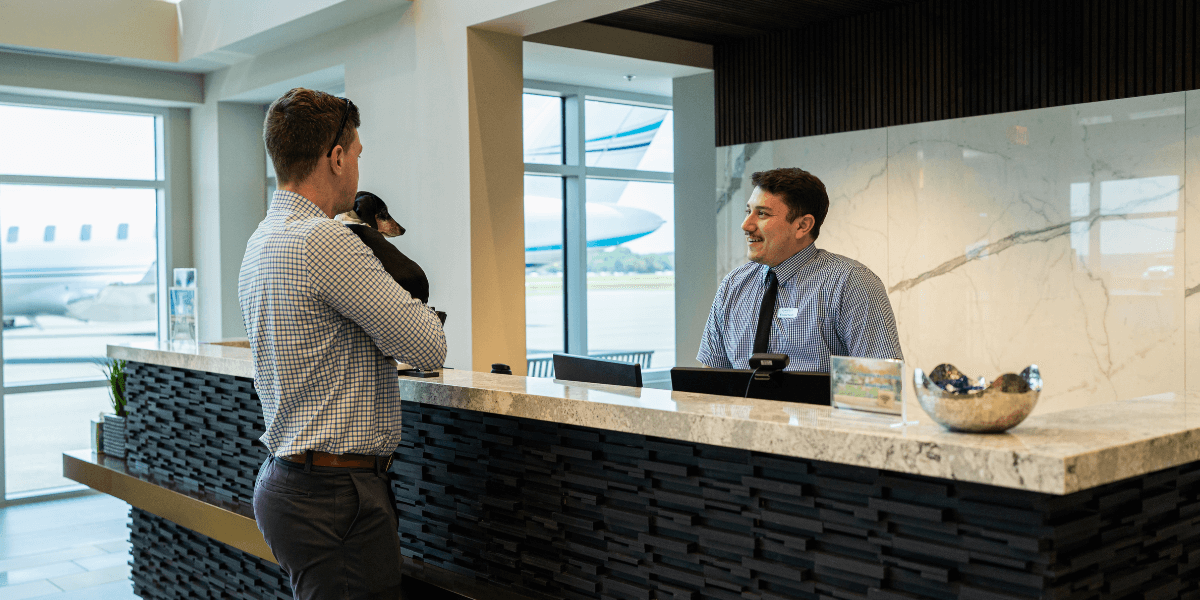Cutting Corners Can Cut Flights Short
Private jet maintenance is critical for preserving airworthiness. Skipping inspections can lead to undetected issues (like fatigue cracks or software malfunctions) that compromise flight safety.
Washington D.C.’s most established FBO, delivering secure hangar
space, reliable fuel, and efficient ground support just 36 miles
from downtown DC.
Management, maintenance, charter, and sales services designed
to keep your aircraft compliant, supported, and ready to fly.
Learn who we are, how we operate, and access resources built
to help aircraft owners, operators, and flight departments make
informed decisions.
3 min read
![]() Chantilly Air
:
Jun 23, 2025 2:37:41 PM
Chantilly Air
:
Jun 23, 2025 2:37:41 PM
Routine private aircraft maintenance is a critical factor in flight safety, operational readiness, and asset value. Deferred maintenance may seem like a cost-saving measure, but it often leads to compliance issues, unexpected downtime, and long-term financial loss.
This blog explores the true cost of deferred maintenance, covering everything from FAA compliance and airworthiness to charter eligibility and long-term financial impact.
Aircraft maintenance refers to the regular inspection, repair, and servicing of an aircraft to ensure its safe operation and compliance with aviation regulations. For private owners, a clear understanding of aircraft maintenance helps safeguard both your asset and long-term aviation costs.
There are two approaches: preventive maintenance (routine inspections, timely part replacements) and reactive maintenance (fixing problems after they arise). While reactive repairs might seem like a way to cut costs in the short term, they often lead to extended downtime, higher expenses, and greater operational risk. The same principle holds true in other fields, where spotting early warning signs through routine upkeep can help prevent more serious system failures down the line.
Working with a fixed base operator (FBO) simplifies maintenance. FBOs with on-site support provide direct access to certified mechanics, FAA Part 145 repair stations, and streamlined aircraft management. Instead of juggling multiple vendors, your aircraft receives coordinated, compliant, and consistent service often under one roof.
When private aircraft maintenance is delayed or neglected, safety is the first thing at risk. Even minor oversights can escalate into critical failures, placing passengers, crew, and aircraft in danger.
Private jet maintenance is critical for preserving airworthiness. Skipping inspections can lead to undetected issues (like fatigue cracks or software malfunctions) that compromise flight safety.
Deferred maintenance has real consequences. Overlooked landing gear wear or missed fluid checks have led to emergency landings and costly investigations, underscoring the risks of ignoring routine aircraft maintenance engineering.
Modern jets are built with system redundancies, but they still depend on skilled oversight. The role of aircraft maintenance engg is to ensure every component meets FAA standards. Falling short can mean grounded aircraft or worse.
The FAA mandates strict maintenance intervals. Delaying required inspections or logbook updates could result in fines or aircraft grounding. If audited, incomplete or missing documentation raises immediate compliance concerns.
Should an incident occur and deferred maintenance is found to be a contributing factor, owners can face lawsuits, insurance denials, and permanent reputational damage. Understanding aircraft maintenance engineering helps owners appreciate the regulatory role of maintenance, not just its mechanical function.
In aviation, documentation is as important as the work itself. FAA inspectors require proof of compliance. Missed entries or improper sign-offs can turn a well-maintained jet into a non-compliant liability overnight.
Deferred costs become emergency expenses. What seems like a short-term savings tactic often results in bigger, unplanned costs down the line, including:
Irreparable component damage
Emergency part orders at premium rates
Prolonged downtime due to limited availability
Delays sourcing specialized parts or technicians
Unscheduled grounding can disrupt operations and revenue. In contrast, routine services like oil analysis, borescope inspections, and diagnostics are cost-effective ways to preserve reliability. A proactive strategy helps control the private aircraft maintenance cost while protecting airworthiness and long-term value.
Whether selling directly or through an aircraft broker, buyers and appraisers scrutinize maintenance logs. Incomplete records or signs of deferred care result in immediate markdowns or deal breakers.
A well-maintained aircraft with clean records moves faster in the resale market. Deferred maintenance introduces delays due to required catch-up work, fresh inspections, or buyer hesitation.
Managed aircraft programs are designed to protect both operational reliability and long-term value. Enrolling in an aircraft management program ensures that routine tasks like oil changes, calendar inspections, and airworthiness directives are handled on schedule. This not only protects airframe integrity but also preserves long-term asset value. Similar strategies apply across industries - smart production environments, for example, rely on structured maintenance protocols to avoid unexpected system failures and costly operational setbacks.
A full-service fixed base operator (FBO) offers more than just fuel and hangar access. They act as a central hub for private aircraft maintenance and operational reliability.
Most FBOs provide:
Certified private aircraft maintenance teams
Access to FAA-certified repair stations
Coordination with manufacturers for warranty and service bulletins
When these services are integrated into a broader aircraft management plan, scheduling, compliance documentation, and maintenance budgeting become seamless. Owners can stay focused on flight operations while ensuring their aircraft remains in peak condition.
For those offering aircraft charter services, this reliability is non-negotiable. Deferred inspections or last-minute repairs can lead to canceled trips and diminished client trust. Partnering with a capable FBO helps reduce that risk and maintain the service excellence charter customers expect.

Managing a private aircraft can quickly become time-consuming, costly, and complex. This guide explains the most common problems aircraft owners...
.png)
Choosing a full-service aircraft provider can significantly shape the experience of owning or operating an aircraft. By combining aircraft...

Owning a private aircraft can be one of the most rewarding investments, offering unparalleled freedom and flexibility. However, it also comes with...